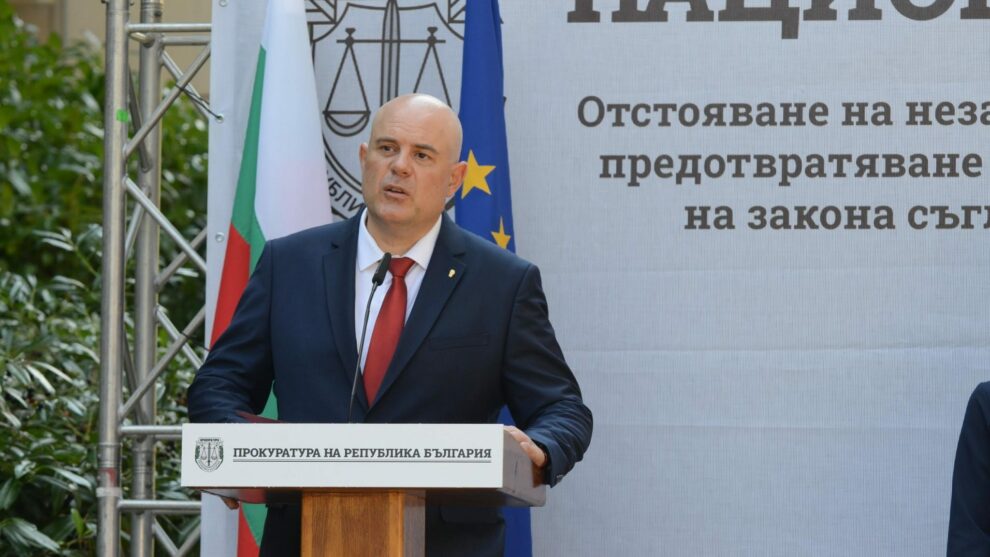Bulgaria’s interim Prime Minister Galab Donev called an immediate national security meeting on May 2 after an explosion close to chief prosecutor Ivan Geshev’s car the previous day.
Authorities have described the blast, which happened as Geshev’s vehicle was slowing down on a highway near the town of Samokov on May 1, as intended to kill the top prosecutor.
Geshev was travelling with his wife and children but no one in the car was injured.
Borislav Sarafov, head of the National Investigation Service, said on May 1 that the bomb had 3kg of TNT and left a three-metre-wide crater. On May 2, he also described the explosives used as “hand-made” but digitally controlled.
Weeks before the attack, on March 16, Geshev declared that conspiracies were being plotted to oust him.
However, critical media published suspicions that the attack was essentially a PR stunt for Geshev.
“There are inconsistencies in the official version of events that don’t add up,” Emanuil Yordanov, who was the country’s interior minister from 1999-2001, told Bulgarian National Radio.
“The level of crime in Bulgaria in recent years does not suggest an assassination attempt on the Prosecutor General. It has been a long time since a crime of an ambitious and serious scale has been committed,” Yordanov added.
Some critics expressed concern that the blast was intended to undermine a legislative push for judicial reform that would make the ousting of Geshev easier.
The draft legislation is being advanced by the We Continue the Change party and the Democratic Party, and is receiving some support from former ruling party GERB, despite its loyalty to Geshev.
“In such cases, the key question is always who has an interest to do such thing. The answer is – no one. That is, except Geshev himself, who actually has an interest in staging an attempt, after realising that it is only a matter of time before he is eliminated by legal means,” lawyer Mikhail Ekimdzhiev told Capital Weekly on May 1, describing the incident as intended to paint Geshev as a victim.
A prosecutor’s office spokesperson said on May 2 that Geshev will not make any official statement and added that rumours that the attack was staged are “inadmissible”.
Geshev’s appointment as chief prosecutor in December 2019 with a seven-year mandate was marred by controversy. He was the sole candidate for the post and was largely seen as the protector of the then acting Prime Minister Boyko Borissov, GERB’s leader.
The nomination caused protests in Sofia and was vetoed by President Rumen Radev. But Geshev remained the only candidate and was elected by the Supreme Judicial Council. In an interview with the Bulgarian National Television in April 2020 he described his role as “an instrument in the hands of God”.
The political parties which rose from the 2020 anti-government protests and found increased visibility in the 2021-2023 election cycle – There’s Such a People, the winners of the July 2021 elections, We Continue the Change, the winners in November 2021, and Democratic Bulgaria –have all called for the removal of Geshev.
The opposition has long wanted to oust Geshev as part of judicial reforms.
Under his mandate, the prosecution has made no significant progress on cases which have gained widespread attention. The investigation into the suspected Novichok poisoning of arms dealer Emiliyan Gebrev in 2015 was halted 2020, while the various scandals around Borissov – from leaked bedroom photos to allegations of corruption and money-laundering and intimidation of critical journalists – passed without much reaction from the prosecution beyond generic statements.
The prosecution remained passive after politicians were sanctioned under the US’s Global Magnitsky Act in 2021 and in February this year when a second list of sanctions was announced.
Meanwhile, a highly publicised series of expulsions of Russian spies in early 2022 have been seen in hindsight as a bid by Geshev to clean up his image.
Source: Balkan Insight










